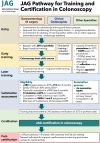JAG consensus statements for training and certification in colonoscopy
- PMID: 37056319
- PMCID: PMC10086724
- DOI: 10.1136/flgastro-2022-102260
JAG consensus statements for training and certification in colonoscopy
Abstract
Introduction: In the UK, endoscopy certification is awarded when trainees attain minimum competency standards for independent practice. A national evidence-based review was undertaken to update and develop standards and recommendations for colonoscopy training and certification.
Methods: Under the oversight of the Joint Advisory Group (JAG), a modified Delphi process was conducted between 2019 and 2020 with multisociety expert representation. Following literature review and Grading of Recommendations, Assessment, Development and Evaluations appraisal, recommendation statements on colonoscopy training and certification were formulated and subjected to anonymous voting to obtain consensus. Accepted statements were peer reviewed by JAG and relevant stakeholders for incorporation into the updated colonoscopy certification pathway.
Results: In total, 45 recommendation statements were generated under the domains of: definition of competence (13), acquisition of competence (20), assessment of competence (8) and postcertification support (4). The consensus process led to revised criteria for colonoscopy certification, comprising: (1) achieving key performance indicators defined within British Society of Gastroenterology standards (ie, unassisted caecal intubation rate >90%, rectal retroversion >90%, polyp detection rate >15%+, polyp retrieval rate >90%, patient comfort <10% with moderate-severe discomfort); (2) minimum procedure count 280+; (3) performing 15+ procedures over the preceding 3 months; (4) attendance of the JAG Basic Skills in Colonoscopy course; (5) terminal ileal intubation rates of 60%+ in inflammatory bowel disease; (6) satisfying requirements for formative direct observation of procedure skills (DOPS) and direct observation of polypectomy skills (Size, Morphology, Site, Access (SMSA) level 2); (7) evidence of reflective practice as documented on the JAG Endoscopy Training System reflection tool; (8) successful performance in summative DOPS.
Conclusion: The UK standards for training and certification in colonoscopy have been updated, culminating in a single-stage certification process with emphasis on polypectomy competency (SMSA Level 2+). These standards are intended to support training, improve standards of colonoscopy and polypectomy, and provide support to the newly independent practitioner.
Keywords: COLONOSCOPY.
© Author(s) (or their employer(s)) 2023. Re-use permitted under CC BY-NC. No commercial re-use. See rights and permissions. Published by BMJ.
Conflict of interest statement
Competing interests: ER has received research funding from Medtronic Ltd.
Figures

Similar articles
-
JAG consensus statements for training and certification in flexible sigmoidoscopy.Frontline Gastroenterol. 2023 Jan 27;14(3):181-200. doi: 10.1136/flgastro-2022-102259. eCollection 2023. Frontline Gastroenterol. 2023. PMID: 37056324 Free PMC article.
-
JAG consensus statements for training and certification in oesophagogastroduodenoscopy.Frontline Gastroenterol. 2022 Jan 24;13(3):193-205. doi: 10.1136/flgastro-2021-101907. eCollection 2022. Frontline Gastroenterol. 2022. PMID: 35493618 Free PMC article.
-
UK and Ireland Joint Advisory Group (JAG) consensus statements for training and certification in diagnostic endoscopic ultrasound (EUS).Gut. 2023 Dec 7;73(1):118-130. doi: 10.1136/gutjnl-2023-329800. Gut. 2023. PMID: 37739777 Free PMC article.
-
Canadian Association of Gastroenterology consensus guidelines on safety and quality indicators in endoscopy.Can J Gastroenterol. 2012 Jan;26(1):17-31. doi: 10.1155/2012/173739. Can J Gastroenterol. 2012. PMID: 22308578 Free PMC article.
-
Assessments and skills improvement for endoscopists.Best Pract Res Clin Gastroenterol. 2016 Jun;30(3):453-71. doi: 10.1016/j.bpg.2016.05.005. Epub 2016 Jun 8. Best Pract Res Clin Gastroenterol. 2016. PMID: 27345651 Review.
Cited by
-
Prospective assessment of learning curve and impact of intensive versus progressive training in colonoscopy competence among French residents.BMC Med Educ. 2025 Mar 11;25(1):367. doi: 10.1186/s12909-025-06924-2. BMC Med Educ. 2025. PMID: 40069701 Free PMC article.
-
Exploring Endoscopic Competence in Gastroenterology Training: A Simulation-Based Comparative Analysis of GAGES, DOPS, and ACE Assessment Tools.Adv Med Educ Pract. 2024 Jan 31;15:75-84. doi: 10.2147/AMEP.S427076. eCollection 2024. Adv Med Educ Pract. 2024. PMID: 38312535 Free PMC article.
-
Twitter debate: should upper gastrointestinal bleeding training and certification be formalised?Frontline Gastroenterol. 2023 Oct 28;15(3):258-260. doi: 10.1136/flgastro-2023-102549. eCollection 2024 May. Frontline Gastroenterol. 2023. PMID: 38665791 Free PMC article. No abstract available.
-
A prospective study on incidence of desaturations in ERCP with non-anesthesiologist sedation and adverse event awareness of endoscopists.Sci Rep. 2025 Jul 2;15(1):22781. doi: 10.1038/s41598-025-04922-4. Sci Rep. 2025. PMID: 40594061 Free PMC article.
-
Do all trainers think the same? Exploring use of the Think Aloud method to understand colonoscopy trainer thought processes.Endosc Int Open. 2025 Jul 23;13:a26339032. doi: 10.1055/a-2633-9032. eCollection 2025. Endosc Int Open. 2025. PMID: 40726521 Free PMC article.
References
LinkOut - more resources
Full Text Sources
